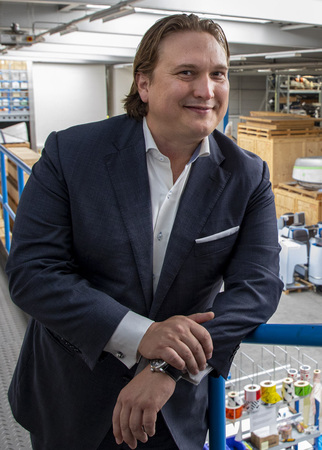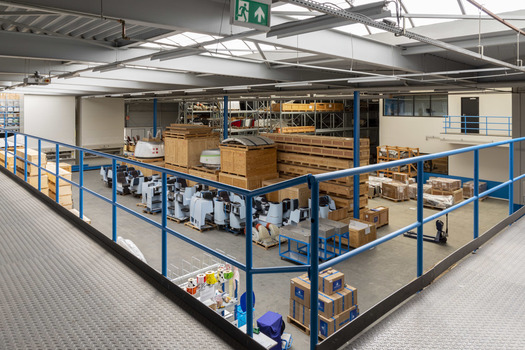- Latest edition October 16th: ABS issuance has a strong start to Q4
- Latest edition October 2nd: ABS issuance fully regains early year momentum
- Latest edition September 18th: Insurers can't appeal London judgement in Russia 'stranded assets' case
- September 4th edition: The latest move in the quest for scale
- August 21st edition: Lessors report record earnings
- August 7th: Sale-Leaseback opportunities to grow
|
The rapid growth already achieved by the Dutch parts specialist APOC has effectively meant that it has outgrown the capacity of its early investors to fund continued growth momentum. So investor Antea has, not without reluctance, relinquished its stake in what it describes as the ‘pearl of our portfolio’, APOC, which has delivered an IRR of over 57 per cent a year for the past four years. Antea is being replaced by a new majority shareholder, Dutch PE investor, Egeria, which has the capacity to support the ambition of APOC’s founder, Max Lutje Wooldrik, to maintain momentum and grow it into a $100 million business over the next few years.
Dutch private equity investor Egeria has taken a majority stake in the Rotterdam-headquartered APOC, which is involved in trading, leasing and part-out of aircraft, engines and landing gears, and plans to inject substantial additional investment in the company. The partnership with Egeria, says APOC founder and CEO, Max Lutje Wooldrik, will enable it to accelerate its growth strategy and transition the business effectively to meet its global expansion targets.
APOC Aviation is a young and innovative player in the market. Based next to Rotterdam Airport, it holds a large stock of quality parts, primarily for A320 and B737ngs, in its own temperature-controlled warehouse, which are sold in AR/SV/OH conditions. It uses its own proprietary software solution to ensure quality standards across all component transactions. ‘Securing funding for our global expansion strategy was not a matter of if, but when,’ Wooldrik said. Founded five years ago, with a record of double-digit growth year on year, APOC plans to reach a target of $100 million in revenue per annum within three years. ‘I am delighted that APOC has attracted a significant investment from Egeria to support and accelerate the next phase of our exciting growth ambitions in coming years,’ Wooldrik said. ‘The company has achieved strong organic growth since its inception and is very well positioned to take advantage of the significant market opportunity available, given its focus on reliability, speed and delivering an optimal service to its customers.’ ‘Securing funding for our global expansion strategy was not a matter of if, but when’ – Max Lutje Wooldrik. APOC intends to use Egeria's investment, which it says is ‘sizeable,’ to supplement its focused narrow body airframe, engines and landing gear acquisition policy, spearhead a transformative global footprint and position its comprehensive inventory of commercial spare parts at the forefront of the industry’s ‘inevitable resurgence’. Speaking with Aviation Finance, Wooldrik said he expected growth would be achieved in all three of the company’s divisions. ‘We envision an increase in the number of air frames that we will part-out and our landing gear and engines divisions are growing strongly. APOC’s services are centred on modern commercial narrow body aircraft and that remains our core focus,’ he said, adding ‘It all depends on the opportunity, we are never closed to new ideas or innovations.’ Asked whether he anticipated expansion in any of the identified markets by way of acquisitions, he said: ‘Egeria is definitely willing to support the growth of APOC through acquisition – but it would have to be a very good fit with our company values. We have a proven formula to operate and grow our business, preferring to build from the ground up with the right people and mentality. Wooldrik said APOC had been in discussions with Egeria prior to the COVID-19 pandemic. ‘There was a great connection and they were enthusiastic about our vision to become a $100 million company within the next few years. Even though the pandemic has delayed the process for a few months, we’re extremely proud that they have sustained real confidence in our performance and the belief in our future strategies to want to share our journey. This is a time of great opportunity in the aviation sector,’ he said. ‘Currently it is an energetic buyers’ market and with this significant investment and future backing from Egeria we are now well positioned to take advantage of the right assets to meet our strategic goals.’ APOC believes, too, that the coronavirus crisis, particularly in the aviation sector, offers great opportunities on the purchasing side for companies with a long-term horizon. ‘You can now buy planes, landing gear and engines at very attractive prices. When the crisis is over, you can make healthy margins in the sale of parts,’ Wooldrik said.’ ‘The devotion of Max and the APOC team perfectly fits within our partnership model to enable companies to outperform within their respective industries over the long-term. We are looking forward to further investing in APOC after the transaction’ – Egeria partner Egbert Prenger. He added that APOC’s next step will be to re-visit its global footprint and it was currently looking at global hubs for its stock in Asia and the US. The company plans to open a base in Singapore before the end of this year to provide ever-faster access to its A320 family and B737 spare component capability as Asian operators get their fleets back into operation. A new US hub is planned for the first quarter of next year.’ Wooldrik said Miami was currently under consideration for this, even though MAAS Aviation, in which Egeria is an investor, has a base in Mobile, Alabama. Asked whether aircraft age-based restrictions in the Asia Pacific region could affect growth opportunities there, Wooldrik said: ‘The Chinese are trying to come on a par with Europe and the US in terms of regulations and the USM market. We have seen that over the past 18 months or so they are making progress and the pandemic may help accelerate this transition. Newer aircraft are now being parted out and we are certainly buying younger airframes so there is now a good opportunity to sell these newer parts across the AsiaPAC region. Geographically we are poised to take advantage of opportunities as they present themselves. Our hub in Singapore is coming on stream now, following the integration of our software, and packages of A320 and B737 spares are arriving in the warehouse ready for regional deployment.’
In relation to the future, Wooldrik said that while no-one could really know where it will go, ‘I am confident that aviation will return to pre-COVID sooner rather than later. Many analysts believe that the demand for used serviceable material (USM) will be strong due to the necessity of continued cost-cutting by operators. APOC is focused on mid-life as opposed to older aircraft and that requirement will not diminish – it may well return even stronger. For older aircraft we are seeing more cargo aircraft take to the skies and a programme of conversions is gathering pace for B737 classics and now A321s – so demand is still there.’ Speaking about its involvement with APOC, Egeria partner Egbert Prenger said his firm had been actively targeting the global aviation sector following its initial investment in Irish-based MAAS Aviation in 2019. ‘We were immediately attracted to APOC’s proprietary tech-enabled platform, strong industry relationships and reputation for excellent quality of service. Under Max Lutje Wooldrik’s leadership, APOC has realised impressive growth to date and a strong market position,’ he said. ‘We are excited to work with the team and support the company’s strategic ambitions. We believe our long-term commitment to the aviation sector, combined with the substantial financial backing, enables APOC to realise their expansion plans over the coming years. The devotion of Max and the APOC team perfectly fits within our partnership model to enable companies to outperform within their respective industries over the long-term. We are looking forward to further investing in APOC after the transaction.’ Founded in 1997, Egeria is an independent Dutch investment company that invests in financially healthy companies with an enterprise value of between €50 million and € 350 million. It currently has investments in several companies, including MAAS Aviation, which between them have a combined turnover of about €2 billion and employ close to 10,000 people. ‘Max has done an excellent job in recent years, achieving substantial revenue growth with excellent profitability,’ said Antea managing partner Robert De Boeck. ‘One of his strengths is that he knows how to gather very good people around him. It is not without reason that he was the winner of the Antea Award for Best Antea entrepreneur last year.’ Antea revealed in a statement that it did consider remaining as a partial shareholder alongside Egeria. ‘We are convinced that this pearl of the Antea portfolio will still make a considerable growth spurt,’ De Boeck said. ‘But Antea is a small fund compared to Egeria, which would dilute us further and leave us with a very small stake without control. That is not in line with our policy. ‘When we entered the company was still in its infancy and in four years we have seen it develop into a dominant player in the world market for used aircraft parts. We have made a return (IRR) of over 57 per cent per year on our equity stake in APOC and we are pleased to have achieved this for our participants. No matter how unfortunate we think it is to say goodbye to a fast-growing company like APOC and a very passionate entrepreneur like Max, there is always a time to come and go. We wish Max and Egeria a good future,’ De Boeck said. Expressing his appreciation for the role played by Antea in the development of APOC Wooldrik commented: ‘Antea joined in 2016 when there was a need for a sounding board and a professional investor with experience with fast-growing companies. I knew Antea from my previous company and, in retrospect, I can say that their entry created a flywheel effect. It helped put the whole business on a more professional footing and having a shareholder like Antea on board made it much easier to obtain financing for projects – something of great importance to a capital intensive company such as ours.’ Vol. 10 Issue 23 of Aviation Finance |


